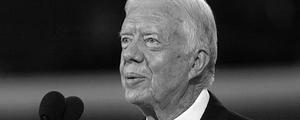PRINCETON, NJ -- President George W. Bush has come under intense pressure from Republicans and conservatives to pardon former vice presidential aide Lewis "Scooter" Libby, convicted Tuesday on charges of perjury, obstruction of justice, and making false statements to federal investigators. A review of Gallup Poll historical data indicates that the public has generally opposed high-profile presidential pardons in the recent past. The evidence is more mixed, however, as to how the pardons affect the president's image in the years after they have been issued.
Americans opposed pardons issued by three recent presidents: (1) Gerald Ford's pardon of former president Richard Nixon, (2) George H. W. Bush's pardon of former Defense Secretary Caspar Weinberger, and (3) Bill Clinton's pardon of financier Marc Rich. This opposition to the pardons had an immediate impact on the public's overall assessment of Ford and Clinton. Ford's job approval ratings fell sharply and Clinton's favorable ratings fell dramatically in the short term. On the other hand, Bush's ratings actually improved after his pardon of Weinberger. The current president Bush, whose job approval rating is at 33% -- including a 9% rating among Democrats -- doesn't have a lot to lose in the court of public opinion, but history suggests that the public's initial reaction to the pardon itself is highly likely to be negative.
Gerald Ford
Public opinion of Ford's controversial pardon of Nixon was negative at the time of the pardon, but became much more positive as time went on.
On Sept. 8, 1974, about a month after Nixon resigned from office, newly installed President Ford granted the former president a full and unconditional pardon for any crimes committed while he was president. A Sept. 6-9, 1974, Gallup Poll, which was in the field as the pardon was announced, found that only 38% of Americans said Ford should pardon Nixon, while 53% said he should not. There was little change in public support in additional polling conducted in 1976. By 1982, however, Americans were asked to look back on the pardon, and were more evenly divided in their views. By 1986, more than half of Americans (54%) said it had been the right thing to do.
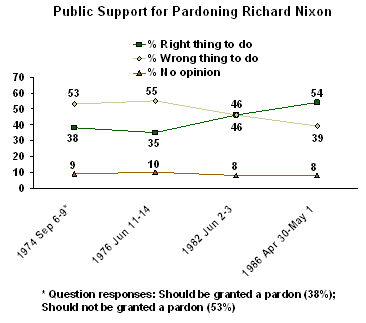
Ford's job approval rating suffered as a result of the Nixon pardon. Ford began his term in office with very high ratings, part of the inevitable sigh of relief on the public's part as Nixon left office and the Watergate affair was no longer dominating the presidency.
But Ford's honeymoon was short-lived. His job approval ratings plummeted following the Nixon pardon and never returned to their pre-pardon levels.
In mid-August 1974, shortly after Ford took office, 71% of Americans approved of the job he was doing as president. By the end of September, only half of Americans approved. And by the end of that year, Ford's approval rating had dipped to 42%. Ford's ratings averaged only 44% for the rest of his administration, never climbing higher than 53%.
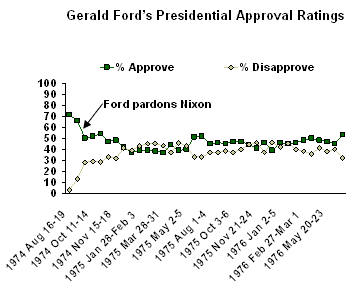
George H. W. Bush
The majority of Americans disapproved of President Bush's pardon of former Secretary of Defense Weinberger, who was scheduled to stand trial in early 1993 for his role in the Reagan administration's Iran-Contra scandal. But the pardon did not appear to have an effect on the public's perception of Bush himself.
Bush issued the pardon on Dec. 24, 1992, after he had become a lame-duck president when Clinton defeated him in the November 1992 election. Both immediately before and after the pardon, only about one in four Americans supported the action.
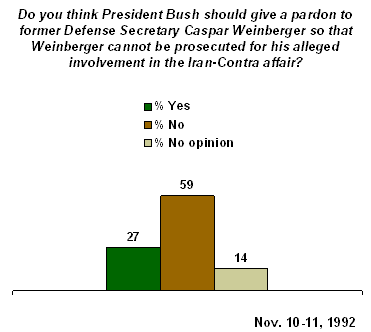
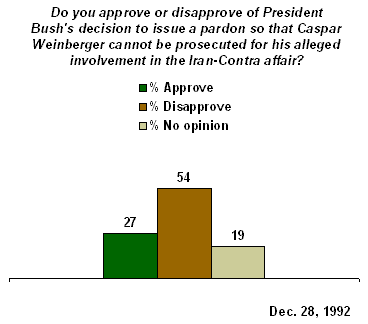
A significant percentage of the American public was skeptical about the underlying reasons for Bush's pardon of Weinberger. In late December 1992, Gallup asked Americans the main reason they thought Bush decided to pardon Weinberger and other Iran-Contra defendants. Nearly half (49%) said he was trying to protect himself from legal difficulties or embarrassment resulting from his own role in the Iran-Contra scandal, while 21% said it was to put the entire ordeal in the country's past and 15% said to protect people he felt acted honorably and patriotically from unfair prosecution.
Not many Americans, however, were paying attention to Bush's pardon of Weinberger at that time. About 4 in 10 Americans said they were following the news coverage "very" or "somewhat" closely. Fifty-seven percent were not paying attention to this story.
Perhaps as a result, and also perhaps because of Bush's handling of issues relating to Somalia, Saddam Hussein, and nuclear arms treaties that received significant attention after the November election, there is no evidence that Bush's image suffered as a result of pardoning Weinberger. Bush's approval rating actually increased around the time of the pardon, from 49% in the days before the pardon to 56% in his final days in office. And his favorable rating was in the mid-40% range in the fall of 1992 in the heat of the election campaign, but rose to the 60% range in early 1993, just before he left office.
Bill Clinton
On his last day in office before George W. Bush took over in January 2001, President Clinton issued several controversial pardons, including pardons for tax evasion and other crimes for Marc Rich and drug charges for his half-brother Roger Clinton. At that time, Gallup asked Americans several questions about Clinton's pardons.
According to a Feb. 1-4, 2001, Gallup Poll, only 34% of Americans approved when asked about the group of pardons Clinton issued on his last day in office, while 50% disapproved. Sixteen percent had no opinion. Gallup found even fewer Americans, 20%, supporting Clinton's decision to pardon Rich specifically, according to a mid-February poll. By early March, public approval of the Rich pardon had decreased to just 11%.
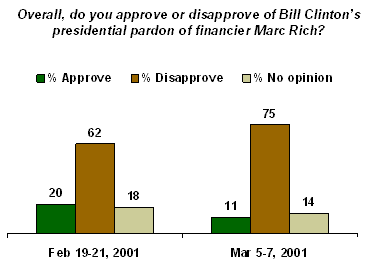
There is little question that Clinton's image was hurt by these controversial pardons in the short term. Before Clinton left office, a majority of Americans (57%) rated him favorably. That rating fell after the pardons, reaching a low of 39% in early March 2001. The 39% favorable for Clinton is the lowest Gallup has ever recorded for him. By the end of 2001, his image had improved. And today, Clinton's favorable ratings are as high as any since 1998.
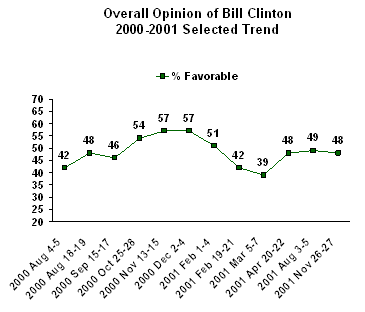
Bottom Line
History suggests that a pardon of Libby by President Bush will most likely be greeted by an immediately negative reaction. This conclusion is bolstered by a review of existing evidence on the public's perception of this case since Libby's indictment in 2005, most of which shows that Americans were predisposed to believe that Libby was guilty from the start.
But despite the probability of a negative reaction to the pardon per se, it is questionable whether a pardon would have a negative impact on Bush's overall job approval or favorability ratings. This is primarily because Bush's standing in the public's eyes is so low already, and because views of Bush are highly polarized.
Bush's job approval rating is at 33%, driven by a very low 9% rating from Democrats, a 28% rating from independents, but a still substantial 70% rating from Republicans. (Vice President Dick Cheney's latest favorable rating is 37%, and is also highly polarized: 73% favorable among Republicans, but only 17% among Democrats.)
Thus, a Bush pardon of Libby cannot depress Bush's image much lower than its current level among Democrats, and can't drop it too much lower among independents, either. A pardon might actually bolster Bush's standing among Republicans, resulting in an overall net positive impact.
Survey Methods
Results are based on telephone interviews with roughly 1,000 national adults, aged 18 and older, conducted across numerous polls since 1976. For results based on each of the total samples of national adults, one can say with 95% confidence that the maximum margin of sampling error is ±3 percentage points. In addition to sampling error, question wording and practical difficulties in conducting surveys can introduce error or bias into the findings of public opinion polls.
